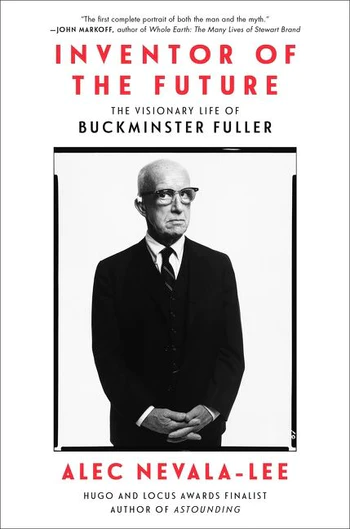
I’ve long been fascinated by the life and work of Buckminster Fuller, who died in 1983 at 87, and whose Wikipedia entry describes him as an “American architect, systems theorist, writer, designer, inventor, philosopher, and futurist.” I was especially drawn to his story because of the chapter “The Prophets: Buckminster Fuller and Marshall McLuhan,” in Peter Drucker’s 1978 memoir Adventures of a Bystander. Drucker writes: “Bucky Fuller and Marshall McLuhan had been friends of mine long before they became celebrities.” And later, when Drucker was on the faculty of Bennington College in Vermont in the 1940s: “When I introduced Bucky at his first speech at Bennington, I told the audience that he would talk for forty-five minutes and then answer questions. Four hours later, Bucky was still talking, and when I tried to break in, he waved me aside and said, “I’m still on my introduction.””
So in August I was intrigued to discover, through my regular perusal of Deborah Kalb’s Book Q&As, that Alec Nevala-Lee had written a new book, Inventor of the Future: The Visionary Life of Buckminster Fuller.

Alec is a novelist, short story writer, and author of the group biography Astounding: John W. Campbell, Isaac Asimov, Robert A. Heinlein, L. Ron Hubbard, and the Golden Age of Science Fiction. We connected after I tweeted a quote from his Q&A with Deborah (my longtime friend and former colleague at Gannett/USA TODAY): “At this point, most of us have started to realize that becoming a figure like Fuller—or Steve Jobs, or Elon Musk—is impossible without some kind of personal cost.” I am grateful to Alec for answering my questions about his book and about the significance of the life and work of Buckminster Fuller:
1. For many years, Buckminster Fuller’s name has been referenced and name-dropped in popular culture, business, academia, and elsewhere. However, is your estimation that, before your book was published, the level of knowledge about Fuller as a person and as a professional was basically superficial or even misguided?
Yes, I do. The greatest obstacle to any objective understanding of Fuller’s legacy is that most of his fans got to know him—either personally or through his work—toward the end of his life, when many of the details of his early career had been forgotten. One of the book’s themes is that the Fuller, who became a global icon in his old age, represented the last stage in the evolution of a man who was much more ambitious, complicated, and flawed than most of his admirers understood.
2. In the Epilogue of your book, you write about the complex (and evolving) legacy of Fuller’s life and work. Although I realize it’s difficult to speculate, if Fuller were alive today, and had to compete in real time in the “marketplace of ideas,” would his futuristic/visionary ideas, concepts, and accomplishments resonate in today’s world (especially in social media) and carry the mystique they had since the latter years of his life, and after his death?
I think that Fuller would have done extremely well today. He was the embodiment of the kind of charismatic visionary who repeatedly finds investors in Silicon Valley, and he would have benefited enormously from access to modern venture capital. Whether or not his designs would have succeeded is another question. He tended to focus on tangible artifacts, like shelters, which can be hard to produce under a startup model, but I don’t have any doubt that he would have found a large and enthusiastic audience for his ideas.
3. What do you see as the most important resonance for Fuller’s life, ideas, and accomplishments for the business/leadership/organizational worlds?
In my book, I argue that Fuller’s life amounts to a handbook on how to initiate hugely ambitious projects using very limited resources. For years, he ran what amounted to a virtual corporation on the platform of the university system, based on little more than a few compelling design ideas, his force of personality, and his ability to excite college students. Anyone who wants to achieve similar goals—for better or for worse—won’t find a better case study than Fuller.
